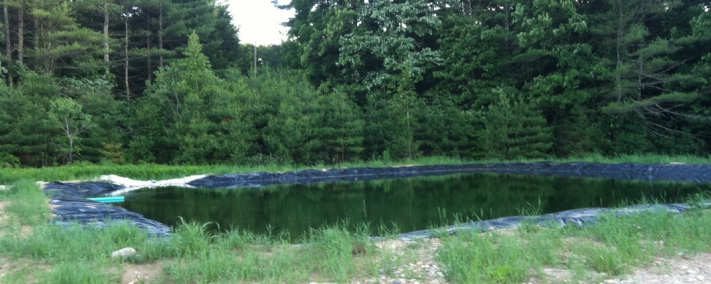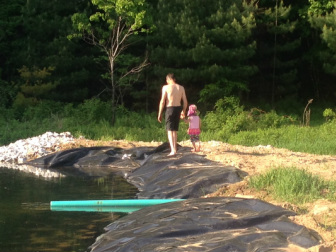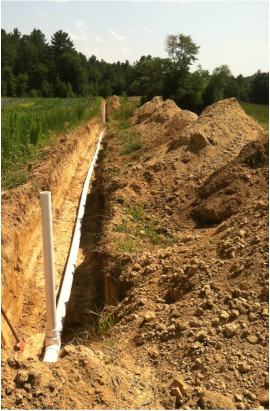| Water, along with soil and sunshine, is one of the critical pieces of the farm mosiac. Plants need it, in the right amounts, at the right time. Too much can be as damaging as too little (which we learned dramatically after Irene), and, as a rule, it's easier to add water than to try and remove it. When we were searching for land, one of the challenges was to balance our needs – we wanted to avoid heavy clay soils, but many of the best soils in Addison county are river-bottom floodplain soils, and after our experience with Irene, we were pretty determined to avoid floodplains as well. We bought this land largely for the soil: a nice, sandy loam, not too gravelly or stony (though we've pulled out some good-sized boulders), enough reasonably flat to grow veggies on. It's proven a good investment. The soil drains nicely, with the small exception of one little hollow in the upper field that bogs down in the spring. It has a good organic matter content, which we've been cultivating with compost and cover crops, and that helps it to hold moisture through dry times. For established crops, we've found that we rarely need to water, and up until this month, we just avoided the boggy section of the field. But we know that things are changing, are likely to change more. Weather patterns are predicted to become more extreme – wetter in the wet times, drier when they're dry. In last year's spring, week upon week of rain, the boggy section spread over much of the upper field, and springs like that may become the norm. We were grateful for our sandy soils then. Stretches of drought are likely as well, and our current irrigation set-up – a sap tank on the back of the pick-up with a hose, which we need especially for new seedlings in dry times – gets less reasonable each time we expand. So, we're investing in some infrastructure in the name of resiliency and efficiency. Last year we began the process of putting in a pond, with the help of the NRCS. They finished it this spring, and we've been working on trenching and laying pipe to bring water to our lower field. From the pipehead, we'll lay drip tape or micro-emitters to distribute water to the plants when they need it. We've got a strong spring feeding the pond, and should have water enough for all our needs. It's been a fun project with Sonora to watch the pond fill, then fill with life, this season. Within a week of water flowing in, the toads had arrived. Soon the pond was thick with toad eggs, then frogs. A few weeks ago the tadpoles began to hatch, and at our last visit they were beginning to grow legs. The tracks of various creatures lead to the water and away. The site is pretty raw still – because of the sandy soil, the pond is lined with black plastic, and we haven't done any landscaping or naturalizing yet – but we can see that in the future it will be a lovely focal point for the property. On the other side, we've put in tile drainage under the boggy section of the upper field, and look forward to having a bit more good flat land to work with. It should help keep that field usable in wet years, and the pond should help us in dry ones. (Or, for that matter, in wet months and dry months, since the two can alternate drastically in a single season.) In all, we hope it will make our farm better prepared for whatever climate awaits us in the future, and it will certainly be better than truck-watering! |
|
0 Comments
A few weeks ago we had a clean-up day to deal with the aftermath of the flooding. Honestly, we'd been pretty depressed about the whole thing - losing that field this year, plus the winter plantings we can't plant, plus the potential of having it happen again, plus the thought of all that food going to waste - and we took up the offer that Annie Harlow made to put our clean-up day out to the ACORN network because we figured if we got a few more hands, we could get it over with more quickly. Well, we sure got some more hands. Those hands included the entire Middlebury College men's soccer team, several of our CSA members, some friends, and a couple of folks hardly even know. It was humbling and gratifying to watch all the energy that these people brought to the work of tearing out plants, pulling up plastic, hauling potatoes, and making the biggest compost pile we've ever had.
It was also incredibly efficient - in literally an hour and a half, our team of 30+ people did what would have been at least two weeks of work for Jeremy and Brian. And it was almost fun! Such an amazing gift to receive from our community. We've also been touched by all the people who stopped by our stand and the market to ask how we're doing and buy an extra squash or two. As climate change makes big weather like Irene more likely and alters the patterns of the seasons, farmers are going to have to adapt in a lot of different ways. Perhaps that gorgeous river-bottom soil will have to be limited to orchards or pasture. Clearly diversification is going to be increasingly important - if we'd been growing only winter squash, we'd be totally screwed. And I think community is going to become more and more important as well - for work parties, for investment in new ideas, for moral support. So the good thing about having lost our field was that we got to see our community in action. And that was pretty great. (Thanks to Annie Harlow for the photos.) And we will be at the market this week! Come give us a hug. :)
We just went out to the field this morning to assess the possible damage from Irene. We both had hopes it wouldn't be too bad because there was no damage to our house or greenhouses. Well we were certainly wrong. The New Haven River tore through our field. The tomatoes, tomatillos, cucumbers, hush cherries, greens, basil, and carrots were all wiped out. The potato hills look unaffected and the melons and winter squash are still there. The peppers are holding on too. The fall broccoli and cauliflower look like they will recover. However, due to food safety concerns we might need to trash everything in the field... more to come as we find out if anything can be salvaged. |
Follow us on Facebook for more updates! Archives
March 2016
Categories
All
|







 RSS Feed
RSS Feed
